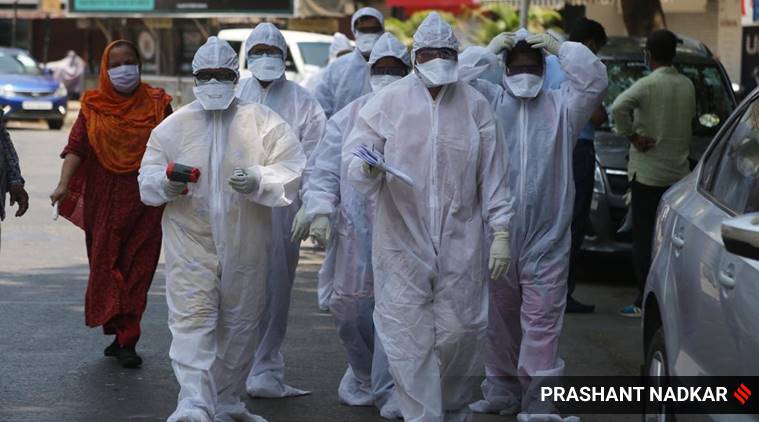 Under the scheme, there will be no capping of costs for medicines and consumables. (Express File Photo/Prashant Nadkar)
Under the scheme, there will be no capping of costs for medicines and consumables. (Express File Photo/Prashant Nadkar)
FOR Covid-19 patients not covered by either a government medical insurance scheme or a private insurer, the Pune Zilla Parishad on Friday morning rolled out a first of its kind scheme to provide financial assistance for treatment at private hospitals. As a tribute to the very large percentage of women who are at the frontline of the fight against the Covid-19 pandemic, the administration named the scheme after India’s first qualified women physician, Dr Rukhmabai Raut.
Under the scheme, any Pune district patient of Covid-19 without insurance cover can avail assistance for payment of private hospitals’ bills from funds made available through a public-private partnership. While the multi-stakeholder Pune Platform for Covid-19 Response (PPCR) that includes nearly 100 corporates as well as civil society members will raise private donations for the scheme, Rs 5 crore has come from the District Planning and Development Council (DPDC) funds and Rs 5 crore from the Zilla Parishad’s cess funds.
There is no income ceiling for patients availing the Dr Rukhmabai Raut Financial Aid Programme for Covid-19. Officials said the Pune ZP has MoUs with finding institutions and hospitals, and patients at all authorised private hospitals in Pune district will be eligible under the scheme. Applications, which will be accepted from Friday, will be approved by the ZP’s Standing Committee and will be accepted until the lifting of curbs imposed under the Epidemic Diseases Act.
“This allows for universalisation of public healthcare,” Pune Zilla Parishad CEO Ayush Prasad told The Indian Express. “Patients who are not covered under any other public healthcare scheme such as Pradhan Mantri Jan Arogya Yojana (PMJAY) or the Mahatma Phule Jan Arogya Yojana (MPJAY) are covered here.”
Under the scheme, there will be no capping of costs for medicines and consumables, while upper limits for payment of other components of the bill including payment for doctors, nurses, PPE, room charges, etc will be Rs 25,000 for asymptomatic patients, Rs 50,000 for patients with mild symptoms, Rs 75,000 for critical patients who require ICU admission and Rs 1,00,000 for critical patients requiring ventilator / life support. “Treatment costs at private hospitals have been a concern, so this will be a further step in ramping up the fight against the pandemic,” Prasad said.
Following reports of very high cost of care at private hospitals, the Maharashtra government recently issued a notification for private hospitals to cap surgery costs for both coronavirus-infected and other patients. But major hospitals have now reached out to Chief Minister Uddhav Thackeray requesting that the order be rescinded, citing losses.
Sudhir Mehta of PPCR, also chairman and managing director of Pinnacle Industries, said corporate India has a stake in seeking good and accessible healthcare for all. “Under this scheme, corporates support part of the cost. Already, one or two large corporates have made donations and the PPCR is contributing some money too,” Mehta told The Indian Express.
For now, the Jankidevi Bajaj group has donated Rs 2 crore for the scheme.
Asked how long private companies will be able to support such a scheme given that Covid-19 positive cases are expected to continue emerging for several months, Mehta said the idea is to give such a scheme a start or impetus. “Corporates have stepped up because there is a need, but corporates have limitations too as businesses are badly affected,” he said, adding that this initiative will help establish data on costs, procedures, transparency and pave the way for perhaps future schemes in which state funds shoulder the larger burden in such cases. This scheme would also counter private hospitals’ reluctance to treat Covid patients over uncertainties in realising bill payments, he said.